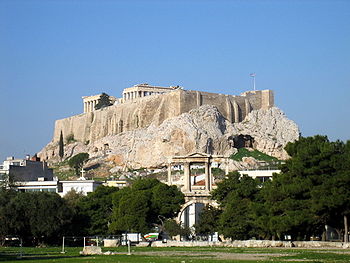
Konstantinos Koukidis
Encyclopedia

Greece
Greece , officially the Hellenic Republic , and historically Hellas or the Republic of Greece in English, is a country in southeastern Europe....
Evzone
Evzones
The Evzones, or Evzoni, is the name of several historical elite light infantry and mountain units of the Greek Army. Today, it refers to the members of the Proedriki Froura , an elite ceremonial unit that guards the Greek Tomb of the Unknown Soldier , the Hellenic Parliament and the Presidential...
on flag guard duty on the 27th of April 1941 at the Athens
Athens
Athens , is the capital and largest city of Greece. Athens dominates the Attica region and is one of the world's oldest cities, as its recorded history spans around 3,400 years. Classical Athens was a powerful city-state...
Acropolis
Acropolis of Athens
The Acropolis of Athens or Citadel of Athens is the best known acropolis in the world. Although there are many other acropoleis in Greece, the significance of the Acropolis of Athens is such that it is commonly known as The Acropolis without qualification...
, at the beginning of the Axis occupation of Greece during World War II. After the first Germans climbed up the Acropolis, an officer ordered him to surrender, give up the Greek flag and raise the Nazi
Nazi Germany
Nazi Germany , also known as the Third Reich , but officially called German Reich from 1933 to 1943 and Greater German Reich from 26 June 1943 onward, is the name commonly used to refer to the state of Germany from 1933 to 1945, when it was a totalitarian dictatorship ruled by...
swastika
Swastika
The swastika is an equilateral cross with its arms bent at right angles, in either right-facing form in counter clock motion or its mirrored left-facing form in clock motion. Earliest archaeological evidence of swastika-shaped ornaments dates back to the Indus Valley Civilization of Ancient...
flag in its place. Koukidis instead chose to stay loyal to his duty by hauling the flag down, wrapping it around his body and jumping down the Acropolis rock to his death. A commemorative plaque is placed on the Acropolis today, to remind people of his act of pride and sacrifice.
During a TV programme on 26/04/2000, then mayor of Athens Dimitris Avramopoulos noted that not any evidence on Koukidis or his deed was documented, bringing forward the importance of such a widespread legend during the Occupation. Further, on the same occasion, Vice General Ioannis Kakoudakis, Director of the Department of the History of the Army, denies the existence of any such person, following purposely and purposeful investigation.
Daily Mail's original article about Koukidis in 1941 as well as relevant discussion is available online.

